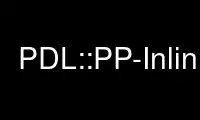
This is the command PDL::PP-Inlinep that can be run in the OnWorks free hosting provider using one of our multiple free online workstations such as Ubuntu Online, Fedora Online, Windows online emulator or MAC OS online emulator
PROGRAM:
NAME
Inline::Pdlpp - Write PDL Subroutines inline with PDL::PP
DESCRIPTION
"Inline::Pdlpp" is a module that allows you to write PDL subroutines in the PDL::PP style.
The big benefit compared to plain "PDL::PP" is that you can write these definitions inline
in any old perl script (without the normal hassle of creating Makefiles, building, etc).
Since version 0.30 the Inline module supports multiple programming languages and each
language has its own support module. This document describes how to use Inline with
PDL::PP (or rather, it will once these docs are complete ";)".
For more information on Inline in general, see Inline.
Some example scripts demonstrating "Inline::Pdlpp" usage can be found in the
Example/InlinePdlpp directory.
"Inline::Pdlpp" is mostly a shameless rip-off of "Inline::C". Most Kudos goes to Brian I.
Usage
You never actually use "Inline::Pdlpp" directly. It is just a support module for using
"Inline.pm" with "PDL::PP". So the usage is always:
use Inline Pdlpp => ...;
or
bind Inline Pdlpp => ...;
Examples
Pending availability of full docs a few quick examples that illustrate typical usage.
A simple example
# example script inlpp.pl
use PDL; # must be called before (!) 'use Inline Pdlpp' calls
use Inline Pdlpp; # the actual code is in the __Pdlpp__ block below
$a = sequence 10;
print $a->inc,"\n";
print $a->inc->dummy(1,10)->tcumul,"\n";
__DATA__
__Pdlpp__
pp_def('inc',
Pars => 'i();[o] o()',
Code => '$o() = $i() + 1;',
);
pp_def('tcumul',
Pars => 'in(n);[o] mul()',
Code => '$mul() = 1;
loop(n) %{
$mul() *= $in();
%}',
);
# end example script
If you call this script it should generate output similar to this:
prompt> perl inlpp.pl
Inline running PDL::PP version 2.2...
[1 2 3 4 5 6 7 8 9 10]
[3628800 3628800 3628800 3628800 3628800 3628800 3628800 3628800 3628800 3628800]
Usage of "Inline::Pdlpp" in general is similar to "Inline::C". In the absence of full
docs for "Inline::Pdlpp" you might want to compare Inline::C.
Code that uses external libraries, etc
The script below is somewhat more complicated in that it uses code from an external
library (here from Numerical Recipes). All the relevant information regarding include
files, libraries and boot code is specified in a config call to "Inline". For more
experienced Perl hackers it might be helpful to know that the format is similar to that
used with ExtUtils::MakeMaker. The keywords are largely equivalent to those used with
"Inline::C". Please see below for further details on the usage of "INC", "LIBS",
"AUTO_INCLUDE" and "BOOT".
use PDL; # this must be called before (!) 'use Inline Pdlpp' calls
use Inline Pdlpp => Config =>
INC => "-I$ENV{HOME}/include",
LIBS => "-L$ENV{HOME}/lib -lnr -lm",
# code to be included in the generated XS
AUTO_INCLUDE => <<'EOINC',
#include <math.h>
#include "nr.h" /* for poidev */
#include "nrutil.h" /* for err_handler */
static void nr_barf(char *err_txt)
{
fprintf(stderr,"Now calling croak...\n");
croak("NR runtime error: %s",err_txt);
}
EOINC
# install our error handler when loading the Inline::Pdlpp code
BOOT => 'set_nr_err_handler(nr_barf);';
use Inline Pdlpp; # the actual code is in the __Pdlpp__ block below
$a = zeroes(10) + 30;;
print $a->poidev(5),"\n";
__DATA__
__Pdlpp__
pp_def('poidev',
Pars => 'xm(); [o] pd()',
GenericTypes => [L,F,D],
OtherPars => 'long idum',
Code => '$pd() = poidev((float) $xm(), &$COMP(idum));',
);
Pdlpp Configuration Options
For information on how to specify Inline configuration options, see Inline. This section
describes each of the configuration options available for Pdlpp. Most of the options
correspond either to MakeMaker or XS options of the same name. See ExtUtils::MakeMaker and
perlxs.
AUTO_INCLUDE
Specifies extra statements to automatically included. They will be added onto the
defaults. A newline char will be automatically added. Does essentially the same as a call
to "pp_addhdr". For short bits of code "AUTO_INCLUDE" is probably syntactically nicer.
use Inline Pdlpp => Config => AUTO_INCLUDE => '#include "yourheader.h"';
BLESS
Same as "pp_bless" command. Specifies the package (i.e. class) to which your new pp_defed
methods will be added. Defaults to "PDL" if omitted.
use Inline Pdlpp => Config => BLESS => 'PDL::Complex';
BOOT
Specifies C code to be executed in the XS BOOT section. Corresponds to the XS parameter.
Does the same as the "pp_add_boot" command. Often used to execute code only once at load
time of the module, e.g. a library initialization call.
CC
Specify which compiler to use.
CCFLAGS
Specify extra compiler flags.
INC
Specifies an include path to use. Corresponds to the MakeMaker parameter.
use Inline Pdlpp => Config => INC => '-I/inc/path';
LD
Specify which linker to use.
LDDLFLAGS
Specify which linker flags to use.
NOTE: These flags will completely override the existing flags, instead of just adding to
them. So if you need to use those too, you must respecify them here.
LIBS
Specifies external libraries that should be linked into your code. Corresponds to the
MakeMaker parameter.
use Inline Pdlpp => Config => LIBS => '-lyourlib';
or
use Inline Pdlpp => Config => LIBS => '-L/your/path -lyourlib';
MAKE
Specify the name of the 'make' utility to use.
MYEXTLIB
Specifies a user compiled object that should be linked in. Corresponds to the MakeMaker
parameter.
use Inline Pdlpp => Config => MYEXTLIB => '/your/path/yourmodule.so';
OPTIMIZE
This controls the MakeMaker OPTIMIZE setting. By setting this value to '-g', you can turn
on debugging support for your Inline extensions. This will allow you to be able to set
breakpoints in your C code using a debugger like gdb.
TYPEMAPS
Specifies extra typemap files to use. Corresponds to the MakeMaker parameter.
use Inline Pdlpp => Config => TYPEMAPS => '/your/path/typemap';
NOISY
Show the output of any compilations going on behind the scenes. Uses "tee" which must be
available on your computer. Default is off.
Use PDL::PP-Inlinep online using onworks.net services
